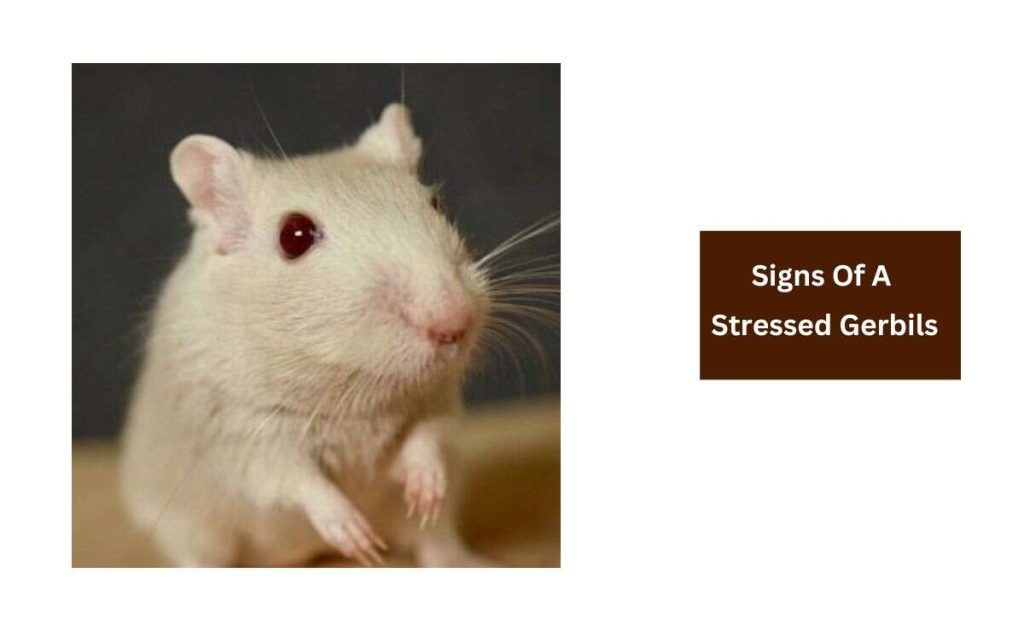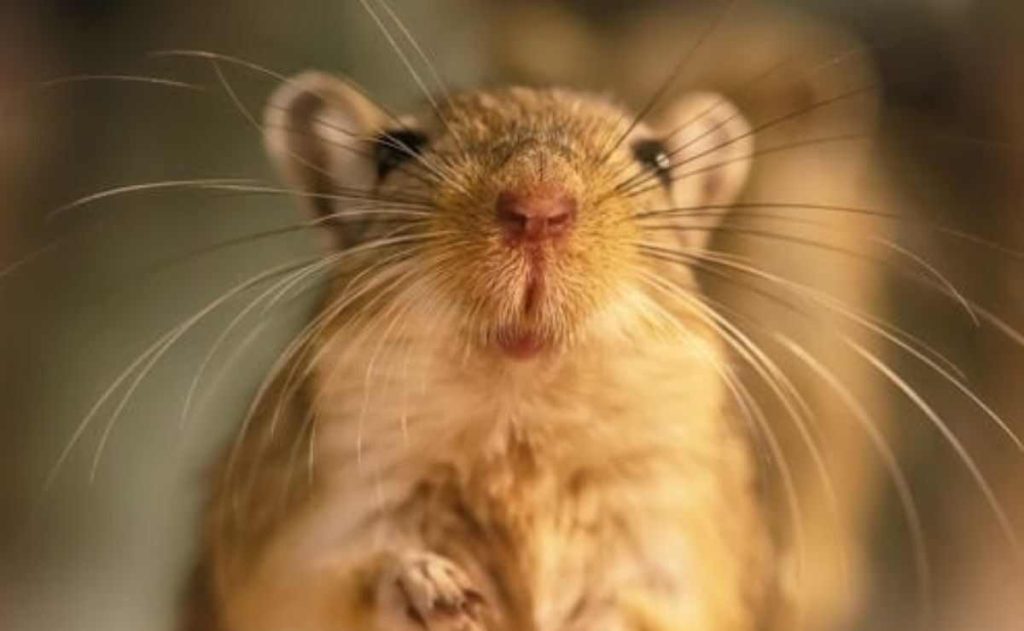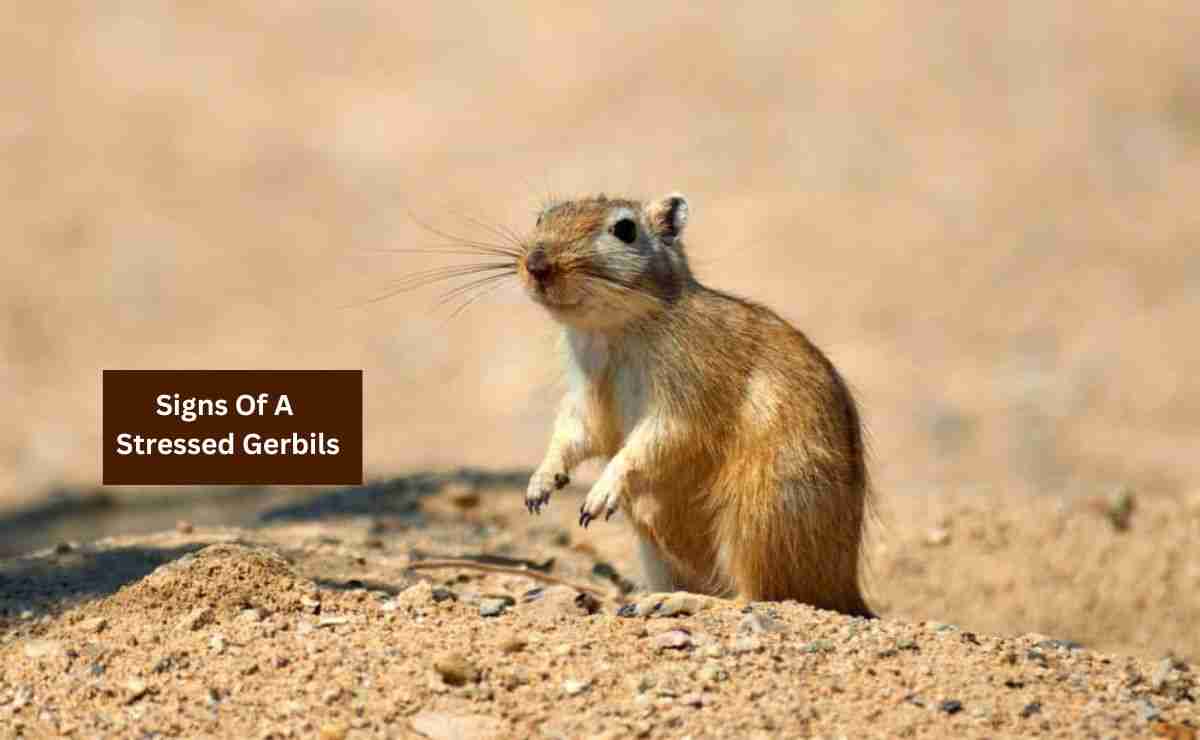Gerbils are small, active rodents known for their energetic and curious nature. However, just like any living creature, gerbils can experience stress. Though it is difficult to identify through their body language, if you are aware you can notice signs of a stressed gerbils.
Much like humans express discomfort when unwell, pets like gerbils also exhibit some potential behaviors when stressed or not feeling well. As a pet owner, you should be there and take care of your gerbils when stressed. So here we will explain some common signs of stressed gerbils to help you tackle the situation.
Signs Of A Stressed Gerbils

Every gerbil has a different nature. So all the gerbils won’t show the same signs when they are stressed. But when your gerbils behave differently than normal, then it’s a clear indication of stress.
You have to recognize the signs of stress in gerbils in order to provide them with the necessary care and support. Some common stress symptoms are:
1. Appetite Loss
A notable change in your gerbil’s eating habits is a key indicator of stress. Ordinarily, consuming around 10 to 15 grams of food per day is a good state for your gerbils. A reduction in appetite means a state of unease.
Much like humans, gerbils experience a decrease in digestive efficiency when in a fight-or-flight mode. If your gerbils do not eat and not drink water for a long period, then understand they are in stress.
2. Hiding
Happy and active gerbils typically roam around and explore their environment. They spend most of their waking hours engaging in activities like digging, playing, and investigating.
However, if you observe your gerbil retreating to their nest or tunnel for extended periods, it may signal an underlying stress in their surroundings.
3. Drumming Feet
Gerbils often resort to a behavior known as drumming when they feel stressed. The rapid stomping of their back feet serves as an alarm signal to warn other gerbils of potential threats.
While occasional drumming is considered normal, frequent instances could indicate an ongoing source of stress in your gerbil’s environment that requires investigation.
4. Aggression
Gerbils are friendly and sociable in nature and they typically enjoy interaction with humans. Sudden aggression or irritability may indicate an underlying stress factor. If this behavior persists over several days, it becomes a concerning signal of stress.
A stressed gerbil often exhibits increased territorial behavior, potentially resorting to biting, either towards you or other gerbils, when it perceives a threat to its territory. These unmistakable signs of stress suggest that the gerbil is grappling with significant stressors and requires your assistance.
5. Anxiety
While baby gerbils are naturally more vocal, adult gerbils tend to be quieter. An increase in vocalizations, especially persistent loud squeaking or teeth chattering, can be indicative of heightened stress levels.
When a gerbil experiences stress, heightened anxiety is a common outcome, just like the human experience of panic attacks. This heightened anxiety manifests as a significant sign that they are no longer in a calm state.
Observing them running in circles might be misleading at first glance. A closer look reveals a peculiar behavior – their tails may appear stuck on the ground or caught on something just behind their backs, creating an illusion of the room spinning from their perspective.
It’s important to note that this behavior doesn’t necessarily indicate illness but rather signals agitation and heightened stress levels.
6. Hyperactivity
In response to stress, some gerbils may exhibit hyperactivity as a coping mechanism. This can manifest as attempts to escape their enclosure or continuous running in circles due to heightened tension.
7. Chromodacryorrhea Chronicles or Red Tears
The presence of red liquid around your gerbil’s eyes or under its nose, known as porphyrin, is not blood but a stress-induced secretion. Excessive porphyrin production, termed chromodacryorrhea, is triggered by stress or illness.
8. Obsessive Behaviors
Normal gerbil behaviors like grooming, scratching, and biting can take a turn towards obsession when your gerbil is stressed. This lead some issues such as rashes or wounds.
Stressed gerbils frequently exhibit over-grooming behaviors, serving as a telltale indicator of their stress levels. In more severe instances, this stress-induced behavior can escalate to the point where they lick their fur off entirely. This extreme grooming is often a sign that they might be feeling very unwell and are attempting to groom themselves to cope with the stress.
9. Change in Toilet Habits
Gerbils are known for their disciplined toilet habits, but stress or fear may disrupt this norm. Increased pooping, even outside their usual spot, may be a sign of stress.
When a gerbil undergoes prolonged stress, it might experience constipation as a consequence of the heightened stress levels. This condition arises due to the need for the gerbil to release pent-up energy caused by stress.
10. Seizures
Some gerbils carry a hereditary predisposition to seizures, particularly when faced with sudden fright or prolonged exposure to stress. This trait tends to run in families, with up to 50% of gerbils potentially being affected.
Identifying a seizure in your gerbil involves recognizing specific symptoms, including freezing, muscle twitching, and their body going either limp or rigid. In some instances, a gerbil may even fall over during a seizure.
It’s important to note that seizures in gerbils are generally not harmful and, and most cases do not pose a significant threat to their health. However, in rare instances, seizures can lead to fatal outcomes. If you observe signs of seizures in your gerbil, seek professional veterinary guidance.
What Causes Stress in Gerbils?

Understanding the sources of stress for your gerbil is essential for providing a conducive and healthy environment. Some common reasons for their stress are
1. Loneliness: Gerbils are inherently social creatures, and captivity requires companionship. Housing a gerbil alone can lead to loneliness and, subsequently, stress. To mitigate this, always keep your gerbil with at least one same-sex companion.
2. Boredom: A lack of mental and physical stimulation can result in boredom and stress. Ensure your gerbil’s environment is enriching by providing ample space, toys, and playtime outside the cage. Lack of space, toys, or playtime can contribute to a stressed gerbil, often manifested through chewing or digging at the enclosure walls.
3. Environmental Stressors: Overstimulation from environmental triggers can stress gerbils. Loud noises, the presence of other pets, or exposure to ultrasonic sounds from household items like TVs and computers can be stressful. Proper handling and minimizing stress-inducing elements are crucial.
4. Illness: Stress can be an indication of underlying health issues. Injuries, allergies, parasites, respiratory illnesses, inner ear problems, or even cancer can contribute to stress. If environmental factors are ruled out, consider consulting a veterinarian to identify and address potential health concerns.
5. Personality: Gerbils, like humans, have distinct personalities. Some may naturally be more anxious or timid. If your gerbil is healthy, and environmental factors are not at play, it might simply have a more anxious disposition. In such cases, providing consistent kindness and meeting its needs can strengthen the bond over time.
What To Do When My Gerbils Is Stressed?
Environmental factors can play a significant role in gerbil stress. Gerbils are sensitive to changes in their surroundings, so any disruptions or disturbances in their habitat can cause stress.
Loud noises, bright lights, and excessive handling can all contribute to stress in gerbils. So give them a quiet, peaceful environment where they feel safe and secure.
Some gerbils enjoy short, supervised walks outside of their cage. This can provide a change of scenery and stimulate their curiosity. However, ensure a safe and controlled environment during these outings.
Adding new toys to your gerbil’s environment can provide mental stimulation and alleviate boredom. Gerbils enjoy items they can chew on, such as wooden toys, to help keep their teeth healthy.
To help alleviate stress in gerbils, you can provide them with a comfortable and enriching habitat. This includes providing them with plenty of bedding material, hiding spots, and opportunities for exercise and mental stimulation. Regularly cleaning their habitat and providing a balanced diet can also help reduce stress.
Overall, spend quality time playing with your gerbil. Gentle interactions, such as petting and talking to your gerbil, can go a long way in reassuring them and strengthening the bond between you.
Final Words
Prolonged stress can indeed have severe consequences for gerbils, potentially leading to sickness and, in extreme cases, even death. Gerbils have small hearts, and stress can exert strain on their cardiovascular system and immune functions, making them more vulnerable to illnesses.
It’s important to identify and address the root cause of stress in gerbils immediately. If you find it challenging to determine the cause of stress or if your gerbil exhibits signs of distress, seeking professional advice from an exotic pet veterinarian is recommended.
